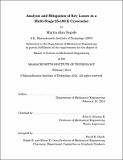Analysis and mitigation of key losses in a multi-stage 25-100 K cryocooler
Author(s)
Segado, Martin Alan
DownloadFull printable version (866.0Kb)
Other Contributors
Massachusetts Institute of Technology. Department of Mechanical Engineering.
Advisor
John G. Brisson II.
Terms of use
Metadata
Show full item recordAbstract
A need exists for small, robust, and efficient cryocoolers operating in the 25-100 K range; however, while technological advances have enabled the development of such machines, a greater understanding of the losses affecting their performance is needed to make informed design tradeoffs. This thesis takes steps to provide this understanding by examining several losses in the context of a multi-stage cryocooler being developed by MIT and Advanced Mechanical Technologies, Inc. Based on a modular Collins-type design, this cryocooler will use computer-controlled floating piston expanders to simultaneously provide 20 and 100 Watts of cooling at 25 and 100 K, respectively. The contributions in this thesis can be divided into two broad categories. The first is concerned with the systems-level efficiency of the cryocooler, and addresses a significant inefficiency caused by an inherent cooler-to-load temperature mismatch. By using an alternative cryocooler configuration with multiple expanders in series, the overall efficiency may be increased by an estimated 24%. A simple memorizable heuristic was also found to estimate the magnitude of the mismatch loss in a given stage of the cryocooler: the fractional increase in operating power is approximately the base-10 logarithm of the pressure ratio divided by twice the number of series expanders, assuming a monatomic working fluid. The second area of research focused on the design of the cryocooler's unique floating piston expanders. A variety of losses affect the performance of these expanders; these range from the obvious to the obscure (e.g., the enhanced "shuttle" heat transfer that arises from reciprocating piston motion) and often favor conflicting design choices. Eleven such losses are discussed along with both existing literature and a new analysis of fluid flow and heat transfer in the piston-cylinder gap. A numerical model incorporating six of these losses was used to gain considerable insight into the design tradeoffs involved in expander design and provide preliminary support for the multi-expander designs discussed earlier. The simulations also challenged a previous design guideline for the piston's stroke length and, unexpectedly, revealed that imperfect expansion and compression can yield a net increase in expander efficiency due to the importance of shuttle heat transfer.
Description
Thesis: S.M., Massachusetts Institute of Technology, Department of Mechanical Engineering, 2014. This electronic version was submitted by the student author. The certified thesis is available in the Institute Archives and Special Collections. Cataloged from student-submitted PDF version of thesis. Includes bibliographical references (pages 119-125).
Date issued
2014Department
Massachusetts Institute of Technology. Department of Mechanical EngineeringPublisher
Massachusetts Institute of Technology
Keywords
Mechanical Engineering.